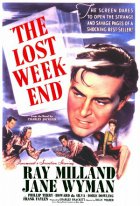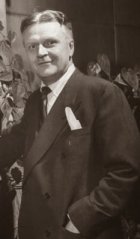
The Lost Weekend
- NOT RATED
- Year:
- 1945
- 101 min
- 972 Views
FADE IN:
A-1 THE MAN-MADE MOUNTAIN PEAKS OF MANHATTAN
on a sunny day in October, 1938. THE CAMERA PANS ACROSS the
distant ridge of midtown buildings, then slowly FINDS A
FOREGROUND:
THE REAR OF A SMALL APARTMENT HOUSE on East 55thStreet.
It is a 4-story affair of brick, housing some eight
apartments, half of them giving on the garden or rather on
the routine back yard with a sumac tree, a stone bench, and
some mouldy flower boxes in which geraniums are dying.
THE MOVING CAMERA CONCENTRATES on the 4th-floor apartment,
which boasts three windows. Two of them give on the living
room, one on the bedroom of the brothers Birnam. THE CAMERA
NARROWS its interest to THE BEDROOM WINDOW.
It is open, like a million other windows in New York that
warm day. What gives it individuality is that from an awning
cleat there dangles down the outside wall something which
very few people hang from their windows: a bottle of whiskey.
Through the window we can see the brothers Birnam packing.
A-2 INT. BEDROOM
It is a smallish room with twin beds in opposite corners,
both of them unmade. There are books on the night tables,
two chests of drawers with some of the drawers open, and the
closet is open too. One door leads to the living room, another
(Maybe this is the time to describe the apartment. You've
seen that living room a hundred times if you know literate,
artistically inclined people. On one wall are bookshelves
surrounding a marble fireplace, on which stands a tiny plaster
bust of Shakespeare. In the shelves, art books and serious
works of fiction: Thomas Mann, F. Scott Fitzgerald, James
Joyce and the like. There are Picasso, Van Gogh and Utrillo
reproductions on the other walls. A comfortable, elderly
armchair stands near one of the windows. There is a studio
couch, a low, tiled table -- oh, you know.
Off the living room is the familiar kitchenette for the light
housekeeping of two bachelors -- i.e. coffee and coffee.
The bathroom, inconveniently enough, is off the entrance
hall. A floor plan, authenticated by the author of the book,
will be furnished on request).
To get back to the bedroom and the Birnam brothers: a small
suitcase lies open on each bed. DON, the brother nearest the
window, is bent over one, putting in socks, shirts, etc. He
is thirty-three, an extremely attractive guy, but ten pounds
underweight, and in his eye there is something rebellious,
something sly.
WICK, two years younger, is much sturdier, kindly,
sympathetic, solid gold. He wears glasses and is smoking a
cigarette. He is on his way from the closet to his suitcase
with some stuff. He throws a sweater across to Don.
WICK:
Better take this along, Don. It's
going to be cold on the farm.
DON:
Okay.
WICK:
How many shirts are you taking?
DON:
Three.
WICK:
I'm taking five.
DON:
Five?
WICK:
I told them at the office I might
not be back till Tuesday. We'll get
there this afternoon. That'll give
us all Friday, Saturday, Sunday,
Monday. We'll make it a long weekend.
DON:
Sounds long, all right.
WICK:
It'll do you good, Don, after what
you've been through.
Don has crossed to the chest of drawers and fished out more
shirts and socks.
WICK:
Trees and grass and sweet cider and
buttermilk and water from that well
that's colder than any other water.
DON:
Wick, please, why this emphasis on
liquids? Noble, upstanding, nauseating
liquids.
WICK:
Sorry, Don.
DON, his back toward Wick, is bent over the suitcase, packing.
His eyes travel to the window.
DON:
Think it would be a good idea if we
took my typewriter?
WICK:
What for?
DON:
(Indignantly)
To write. To write there. I'm going
to get started on my novel.
WICK:
You really feel up to writing?
DON:
Why not?
WICK:
I mean, after what you've been
through.
DON:
I haven't touched the stuff for ten
days now.
WICK:
I know you haven't. Where's the
portable?
DON:
In the living room closet, kind of
towards the back.
Bent forward tensely, he watches Wick go into the living
room. Left alone, he acts with lightning rapidity. He takes
the sweater, goes over to the window, pulls up the whiskey
bottle, wraps the sweater around it so that only the top
with the string around it shows. He tries to loosen the noose
but he's nervous and loses a precious second.
From the living room has been coming the sound of Wick opening
the closet door and ransacking. Now comes:
WICK'S VOICE
You sure it's in the closet? I can't
find it.
DON:
(Working desperately)
Look by the big chair.
WICK'S VOICE
(Approaching fast)
Isn't it under your bed?
Don sees he can't loosen the string in time. In the last
fraction of a second before Wick enters, he manages to lower
the bottle back down the wall. With what nonchalance he can
muster he bends down and looks under the bed just as Wick
enters, a sheaf of white paper in his hand.
DON:
Of course. Here it is.
He pulls out a Remington portable, 1930 model.
WICK:
Here's some paper.
He puts it in Don's suitcase.
WICK:
We'll fix a table on the south porch.
Nobody to disturb you -- I'll see to
it. Except maybe Saturday night we'll
go over to the Country Club.
DON:
I'm not going near that Country Club.
WICK:
Why not?
DON:
Because they're a bunch of hypocrites
and I don't like to be whispered
about:
Look who's here from New York.The Birnam brothers -- or rather the
nurse and the invalid.
WICK:
Stop that, Don. Nobody there knows
about you.
DON:
No? We get off the train and the
alarm is sounded: The leper is back.
Better hide your liquor.
Footsteps have been racing up the stairs outside the flat,
and now there is a distinctive ring of the doorbell: short,
short, long, short.
DON:
Helen.
WICK:
I'll take it.
He goes toward the door while the bell resumes short, short,
long, short.
From the bedroom we see him open the door. It's HELEN, all
right. She is a clean-cut, good looking girl of twenty-six.
Her face is brave, gay piquant. She's wearing a three-quarter-
length leopard coat. The Indian Summer day is a good ten
degrees too warm for the coat, but that doesn't stop Helen
from wearing her beloved. In her hand are two books wrapped,
and another small package. She enters breathlessly.
HELEN:
Hello, Wick. Where's Don?
Seeing him, she crosses to the bedroom.
HELEN:
Glad I made it. I was afraid you
might be gone. Presents.
She puts the packages in the suitcase.
HELEN:
The new Thurber book, with comical
jokes and pictures, and a quiet little
double murder by Agatha Christie.
(Putting in the second
package)
Cigarettes and chewing gum.
DON:
Thanks, Helen.
HELEN:
Now have a good time, darling. And
remember -- lots of sleep, lots of
milk --
DON:
And sweet cider and some of that
nice cold water from the well.
HELEN:
Bend down.
It's a running gag between these two. Don bends so that she
can kiss him on the cheek.
HELEN:
I'd better be going. I've missed ten
minutes of the concert already.
Translation
Translate and read this script in other languages:
Select another language:
- - Select -
- 简体中文 (Chinese - Simplified)
- 繁體中文 (Chinese - Traditional)
- Español (Spanish)
- Esperanto (Esperanto)
- 日本語 (Japanese)
- Português (Portuguese)
- Deutsch (German)
- العربية (Arabic)
- Français (French)
- Русский (Russian)
- ಕನ್ನಡ (Kannada)
- 한국어 (Korean)
- עברית (Hebrew)
- Gaeilge (Irish)
- Українська (Ukrainian)
- اردو (Urdu)
- Magyar (Hungarian)
- मानक हिन्दी (Hindi)
- Indonesia (Indonesian)
- Italiano (Italian)
- தமிழ் (Tamil)
- Türkçe (Turkish)
- తెలుగు (Telugu)
- ภาษาไทย (Thai)
- Tiếng Việt (Vietnamese)
- Čeština (Czech)
- Polski (Polish)
- Bahasa Indonesia (Indonesian)
- Românește (Romanian)
- Nederlands (Dutch)
- Ελληνικά (Greek)
- Latinum (Latin)
- Svenska (Swedish)
- Dansk (Danish)
- Suomi (Finnish)
- فارسی (Persian)
- ייִדיש (Yiddish)
- հայերեն (Armenian)
- Norsk (Norwegian)
- English (English)
Citation
Use the citation below to add this screenplay to your bibliography:
Style:MLAChicagoAPA
"The Lost Weekend" Scripts.com. STANDS4 LLC, 2025. Web. 12 Mar. 2025. <https://www.scripts.com/script/the_lost_weekend_173>.







Discuss this script with the community:
Report Comment
We're doing our best to make sure our content is useful, accurate and safe.
If by any chance you spot an inappropriate comment while navigating through our website please use this form to let us know, and we'll take care of it shortly.
Attachment
You need to be logged in to favorite.
Log In